
Journal of Cosmology and Astroparticle Physics
metrics 2024
Charting New Frontiers in Astroparticle Research
Introduction
The Journal of Cosmology and Astroparticle Physics (ISSN: 1475-7516) is a premier publication in the field of astronomy and astrophysics, dedicated to advancing our understanding of the cosmos through innovative research. Published by IOP Publishing Ltd in the United Kingdom, this journal has established itself as a vital resource for researchers, professionals, and students alike, with an impressive Scopus rank of #11/90, placing it in the top 12% of its field. The journal aims to foster the dissemination of groundbreaking studies related to cosmology, dark energy, particle physics, and the universe's fundamental structure, making it a key player in shaping contemporary astrophysics discourse. With a Category Quartile of Q2 as of 2023, it continues to attract high-quality contributions that enhance scholarly dialogue. As an accessible platform, it engages a diverse audience interested in the frontiers of astrophysical research, encouraging collaboration and knowledge sharing among the global scientific community.
Metrics 2024
 0.93
0.93 5.30
5.30 5.50
5.50 141
141Metrics History
Rank 2024
Scopus
IF (Web Of Science)
JCI (Web Of Science)
Quartile History
Similar Journals
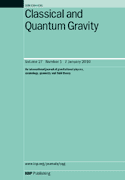
CLASSICAL AND QUANTUM GRAVITY
Advancing Theories in Classical and Quantum RealmsCLASSICAL AND QUANTUM GRAVITY is a prestigious journal published by IOP Publishing Ltd, positioning itself at the forefront of research in the domain of theoretical physics, particularly focusing on gravitational theories in both classical and quantum frameworks. With an impressive Q1 rank in the field of Physics and Astronomy, it has established a significant academic presence since its inception in 1984. This journal offers a platform for disseminating high-quality research findings and critical reviews, playing a pivotal role in advancing our understanding of the foundations of gravitational physics. Researchers and professionals alike will find this scholarly publication an invaluable resource for staying abreast of the latest developments in gravitational theory, quantum gravity, and related interdisciplinary studies. Despite the absence of open access options, its vibrant print and online presence ensures that contributions are accessible to the global scientific community. With a commitment to fostering innovation in an area that remains central to modern physics, CLASSICAL AND QUANTUM GRAVITY continues to attract cutting-edge research that shapes the future of gravitational studies.

Gravitation & Cosmology
Charting the Frontiers of Cosmic ExplorationGravitation & Cosmology is a vital academic journal founded to explore the profound concepts of gravitation and the dynamics of the universe. Published by MAIK NAUKA/INTERPERIODICA/SPRINGER, this journal features a comprehensive range of research articles, reviews, and theoretical insights that advance the field of astronomy and astrophysics. With a current impact factor reflective of its esteemed contribution, Gravitation & Cosmology operates within the upper tier of its discipline, classified as Q3 in Astronomy and Astrophysics for 2023. Although not an open-access publication, the journal fosters a vibrant community of scholars and practitioners by providing rigorous peer-reviewed content accessible through various academic platforms. Covering converged years from 2008 to 2024, this journal serves as an indispensable resource for anyone keen on deepening their understanding of gravitational phenomena and cosmological theories. Researchers, professionals, and students alike will find valuable insights and innovative research that push the boundaries of contemporary astrophysical knowledge.
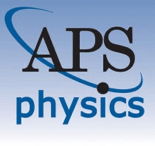
PHYSICAL REVIEW D
Exploring the Depths of Quantum Field TheoryPHYSICAL REVIEW D, published by the American Physical Society, is a premier journal dedicated to the rapid dissemination of significant research findings in the fields of Nuclear and High Energy Physics as well as Physics and Astronomy. With an impressive Impact Factor and a prestigious Q1 ranking in 2023, it stands as one of the leading journals in its domain, with a Scopus ranking of #6 out of 87 in its category, placing it in the 93rd percentile. The journal welcomes rigorous theoretical and experimental studies that advance understandings in particle physics, cosmology, and quantum field theory. Although it does not provide open access, researchers gain a significant platform to reach a global audience and contribute to the ongoing discourse within the scientific community. Published regularly since its convergence starting in 1989, it remains essential for both emerging and established scholars looking to stay at the forefront of high-energy and nuclear physics research.
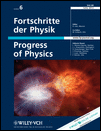
FORTSCHRITTE DER PHYSIK-PROGRESS OF PHYSICS
Advancing the Frontiers of Physics ResearchFORTSCHRITTE DER PHYSIK-PROGRESS OF PHYSICS, published by WILEY-V C H VERLAG GMBH, is a prestigious academic journal esteemed within the field of physics. With a history spanning over seven decades since its inception in 1953 and a converged publication up until 2024, this journal has established itself as a leading source for groundbreaking research and developments across diverse domains in physics and astronomy. Holding an influential Q1 ranking in the 2023 category of Physics and Astronomy (miscellaneous), it serves as an essential platform for disseminating high-quality research findings and theoretical advancements. Although not an Open Access publication, FORTSCHRITTE DER PHYSIK provides access to critical insights and scholarly discussions that are pivotal for researchers, professionals, and students alike. The journal is committed to contributing to the evolution of knowledge in physics, supporting the academic community through rigorous peer-reviewed articles, reviews, and innovative studies.
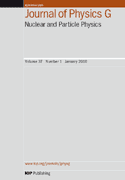
JOURNAL OF PHYSICS G-NUCLEAR AND PARTICLE PHYSICS
Elevating Knowledge in Nuclear Science and BeyondJOURNAL OF PHYSICS G-NUCLEAR AND PARTICLE PHYSICS, published by IOP Publishing Ltd, stands as a premier journal in the realm of Nuclear and High Energy Physics. With an established presence since 1989 and currently converging toward 2024, this influential journal emphasizes groundbreaking research and discoveries in particle physics, fostering the dissemination of knowledge among a global audience of researchers, professionals, and students. Recognized for its high-quality publications, it holds a Q1 ranking in its category for 2023, placing it at an impressive 87th percentile among 87 journals in its field as per Scopus Rankings. The journal's impact is reflected in its esteemed reputation, making it an essential resource for advancing the frontiers of physics. Although it currently does not operate under an open access model, the journal ensures that subscribers receive comprehensive insights into the latest developments and theoretical advances that shape our understanding of the universe.

Living Reviews in Relativity
Unveiling the Latest in Relativity ResearchLiving Reviews in Relativity, published by SPRINGER INT PUBL AG, stands at the forefront of the field of relativity, offering a dynamic platform for the dissemination of high-quality, peer-reviewed research. Since its inception in 1998, this Open Access journal has committed to providing continuous updates and comprehensive reviews, making it an indispensable resource for researchers and scholars in the categories of Physics and Astronomy, where it holds a prestigious Q1 ranking. With its impressive Scopus ranking of #1 out of 81 in the Physics and Astronomy (miscellaneous) category, it boasts a remarkable 99th percentile ranking, underscoring its significance in advancing scientific discourse. Operating out of Switzerland, Living Reviews in Relativity serves as a vital conduit for sharing knowledge and insights, fostering collaborative research, and promoting timeless discussions in the ever-evolving landscape of relativistic physics.
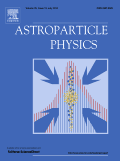
ASTROPARTICLE PHYSICS
Exploring the Cosmic Frontier of Particle PhysicsASTROPARTICLE PHYSICS is a premier international journal dedicated to advancing the understanding of the intersection between particle physics, astronomy, and astrophysics. Published by Elsevier, this journal has established itself as a leading source of research insights since its inception in 1992, with a remarkable impact factor positioning it within the Q1 category for Astronomy and Astrophysics for 2023. With a Scopus ranking of 18 out of 90 in its field, representing the top 80th percentile, ASTROPARTICLE PHYSICS serves as an essential platform for disseminating groundbreaking research that influences astrophysical studies and cosmological theories. Researchers and academics have access to a robust collection of peer-reviewed articles that explore various dimensions of astroparticle phenomena, collaborative cosmic investigations, and theoretical advancements. Although not an open-access journal, it provides extensive research coverage accessible to a global audience from its headquarters in Amsterdam, Netherlands, offering a vital resource for those seeking to push the boundaries of knowledge in the realms of astrophysics and particle physics.

Journal of High Energy Astrophysics
Exploring the Cosmos: Unraveling High-Energy MysteriesThe Journal of High Energy Astrophysics, published by Elsevier, is a premier platform for groundbreaking research in the fields of astrophysics and high-energy phenomena. With an ISSN of 2214-4048 and an E-ISSN of 2214-4056, this journal has quickly established itself as a leader since its inception in 2014. Operating out of the Netherlands, it is recognized for its rigorous peer-review process and high-quality publications, earning an impressive Q1 ranking across multiple domains, including Astronomy and Astrophysics, Nuclear and High Energy Physics, and Space and Planetary Science in 2023. With a Scopus rank of 12 out of 90 in the Astronomy and Astrophysics category, and being positioned in the 87th percentile, the journal plays a pivotal role in disseminating advancements and fostering collaboration among researchers, professionals, and students. Though the journal is not open access, it offers robust subscription options for institutions and individuals seeking to dive into the latest discoveries and theories in high-energy astrophysics.

EUROPEAN PHYSICAL JOURNAL C
Advancing the Frontiers of Physics and EngineeringEUROPEAN PHYSICAL JOURNAL C (EPJ C), published by SPRINGER, stands as a premier platform for innovative research in the domains of Physics and Engineering. With its Open Access policy established in 2014, EPJ C ensures that groundbreaking findings are readily available to the global scientific community, enhancing accessibility and collaboration. The journal, indexed in prestigious databases, boasts an impressive impact factor and ranks within the Q1 category for both Engineering and Physics and Astronomy, placing it among the top-tier journals in these fields. Celebrated for its rigorous peer-review process, EPJ C offers a wide-ranging scope encompassing various topics in particle physics, quantum field theory, and related interdisciplinary studies. Its consistent publication since 1991 has fostered a vibrant community of researchers dedicated to advancing knowledge and innovation in physics and engineering. Join the scholarly discussion and contribute to the cutting-edge research made possible through EPJ C's esteemed platform.
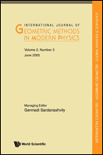
INTERNATIONAL JOURNAL OF GEOMETRIC METHODS IN MODERN PHYSICS
Bridging Geometry and Modern Scientific InquiryINTERNATIONAL JOURNAL OF GEOMETRIC METHODS IN MODERN PHYSICS is a leading academic publication dedicated to the interdisciplinary exploration of geometric methods in the realms of modern physics. Published by WORLD SCIENTIFIC PUBL CO PTE LTD, this esteemed journal is based in Singapore and acts as a critical platform for researchers, professionals, and students seeking to delve into the intricacies of modern theoretical physics and its geometric foundations. With an impressive Scopus ranking placing it in the 64th percentile of its category, the journal highlights innovative research and developments from 2005 to 2024 within its scope. While currently not offering Open Access, it remains a vital resource for the dissemination of valuable knowledge in its field, contributing significantly to the advancement of physics and astronomy. We encourage the academic community to explore this exceptional journal for cutting-edge insights and to further enhance their understanding of geometric applications in modern scientific inquiry.